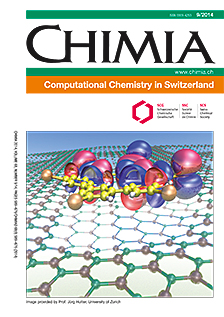Chemicals Inducing Seed Germination and Early Seedling Development
DOI:
https://doi.org/10.2533/chimia.2014.654Keywords:
Brassinosteroids, Gibberellins, Karrikins, Seed germination, StrigolactonesAbstract
Seed germination and early seedling development are essential events in the plant life cycle that are controlled largely by the interplay and cross-talk between several plant hormones. Recently, major progress has been achieved in the elucidation at the molecular level of the signalling of these phytohormones. In this review, we summarise the data for the most promising classes of compounds, which could find potential agronomic applications for promoting seed germination and early seedling development even under abiotic stress conditions. Structural modifications of plant hormones are required to improve their biological performance and their specificity to allow commercial application.Downloads
Published
2014-09-24
Issue
Section
Scientific Articles
License
Copyright (c) 2014 Swiss Chemical Society

This work is licensed under a Creative Commons Attribution-NonCommercial 4.0 International License.
How to Cite
[1]
Chimia 2014, 68, 654, DOI: 10.2533/chimia.2014.654.







